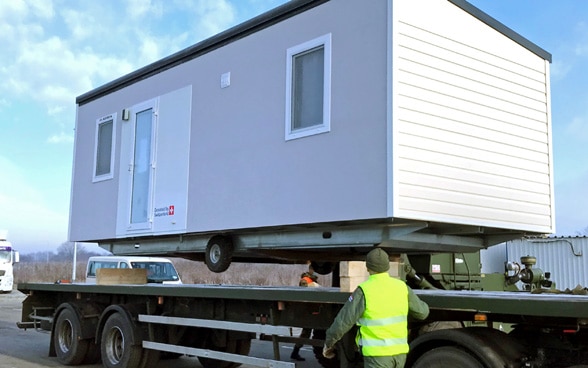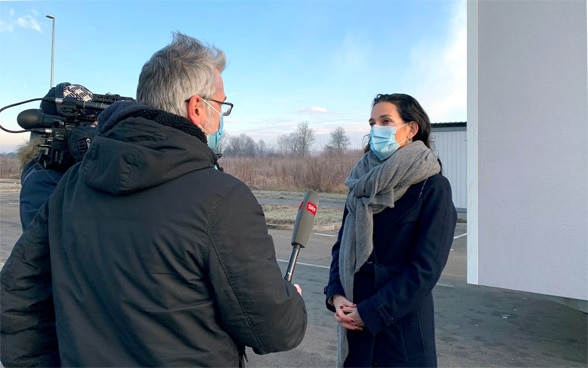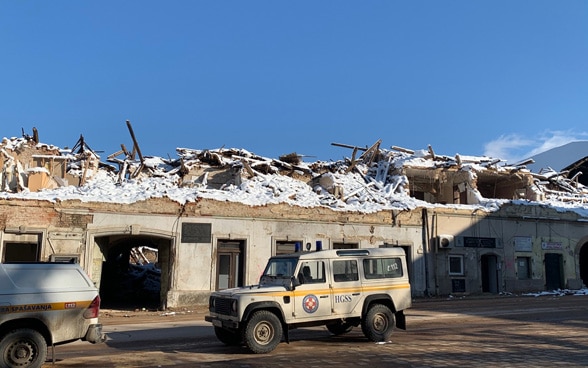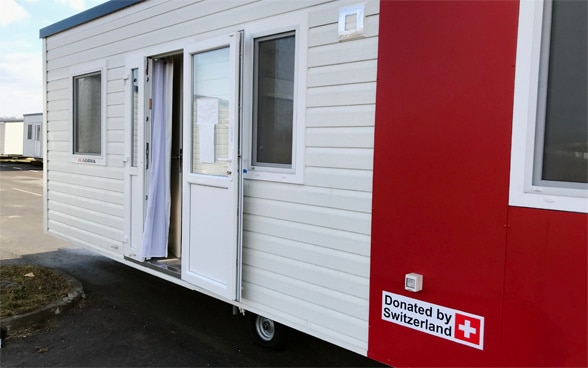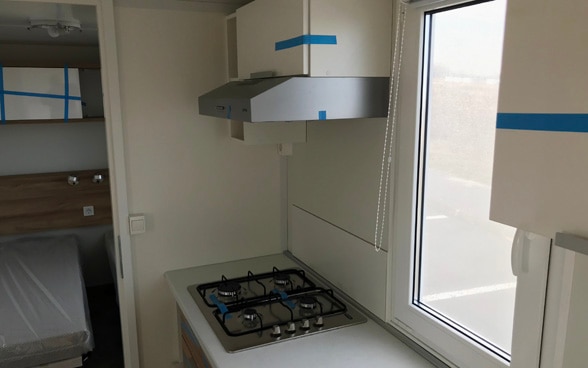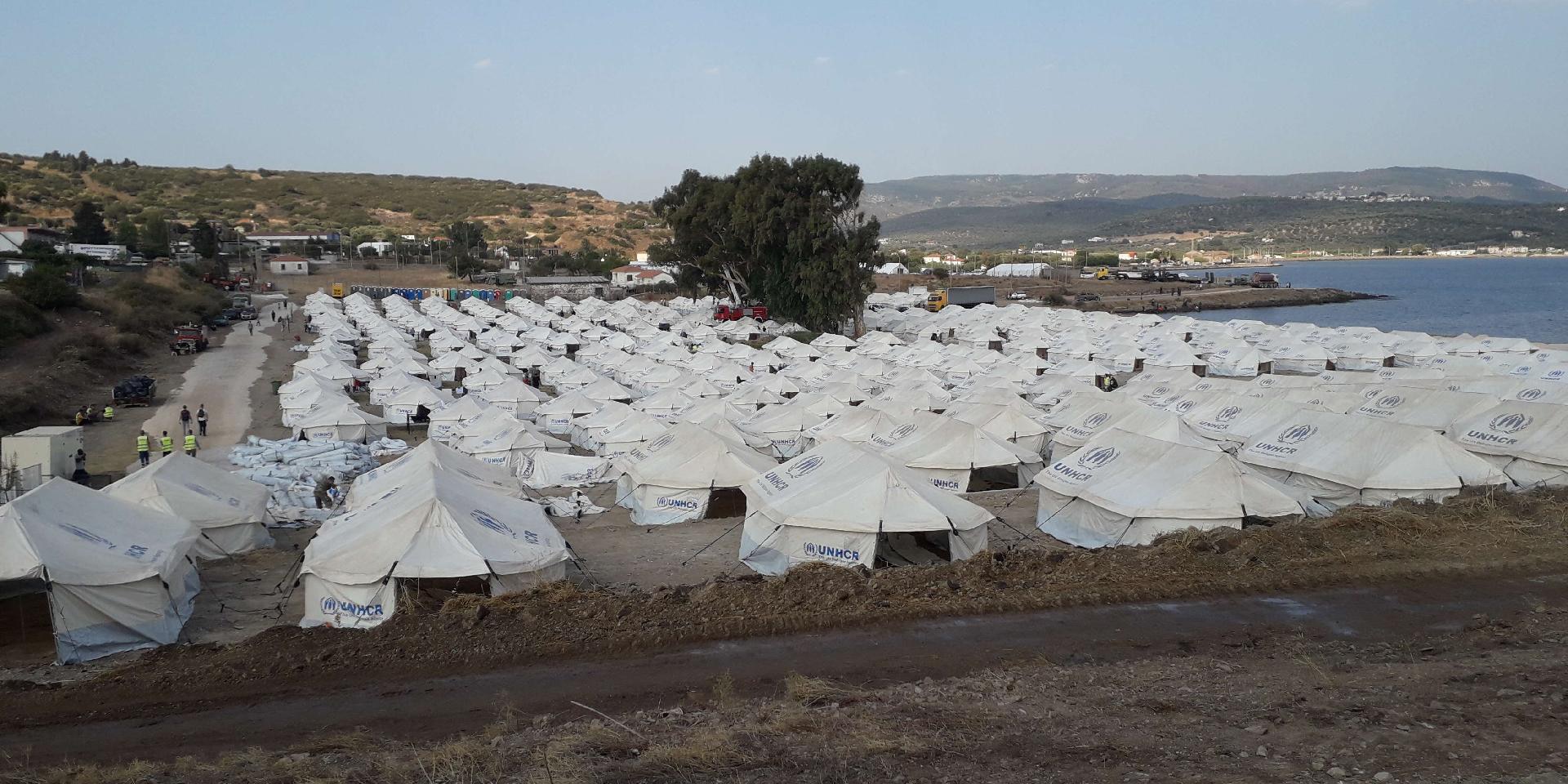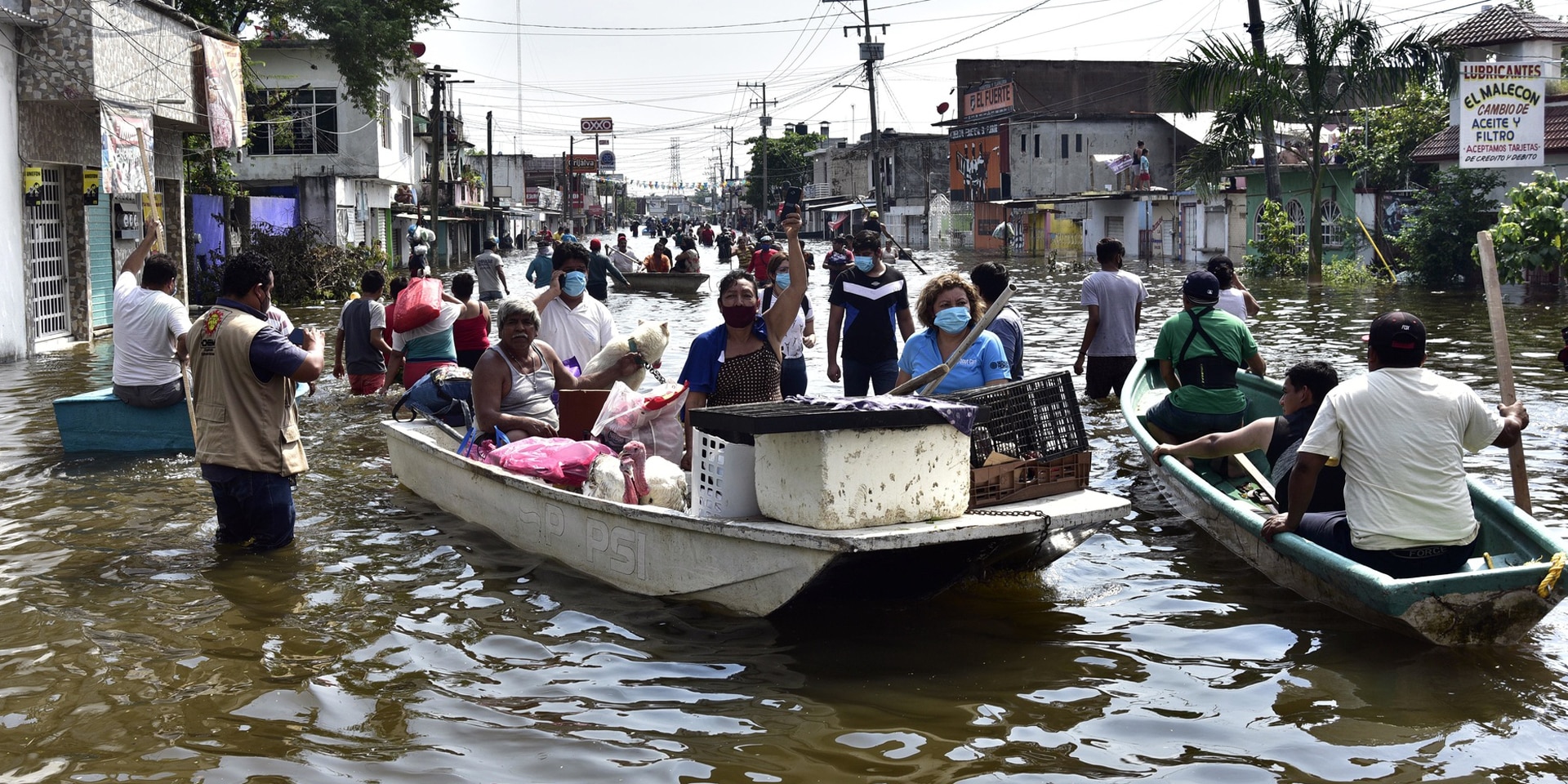Switzerland and Croatia: cooperation and dialogue – even in emergencies
At the end of January, Swiss Humanitarian Aid completed the first phase of its mission in Croatia. Some 20 mobile housing units for victims of the recent earthquake were delivered to the country's civil protection authorities. Ambassador Emilija Georgieva speaks to us from Zagreb about the embassy's role in Croatia and the good relations the two countries have cultivated over the years. Cooperation and dialogue emerged as the key themes.
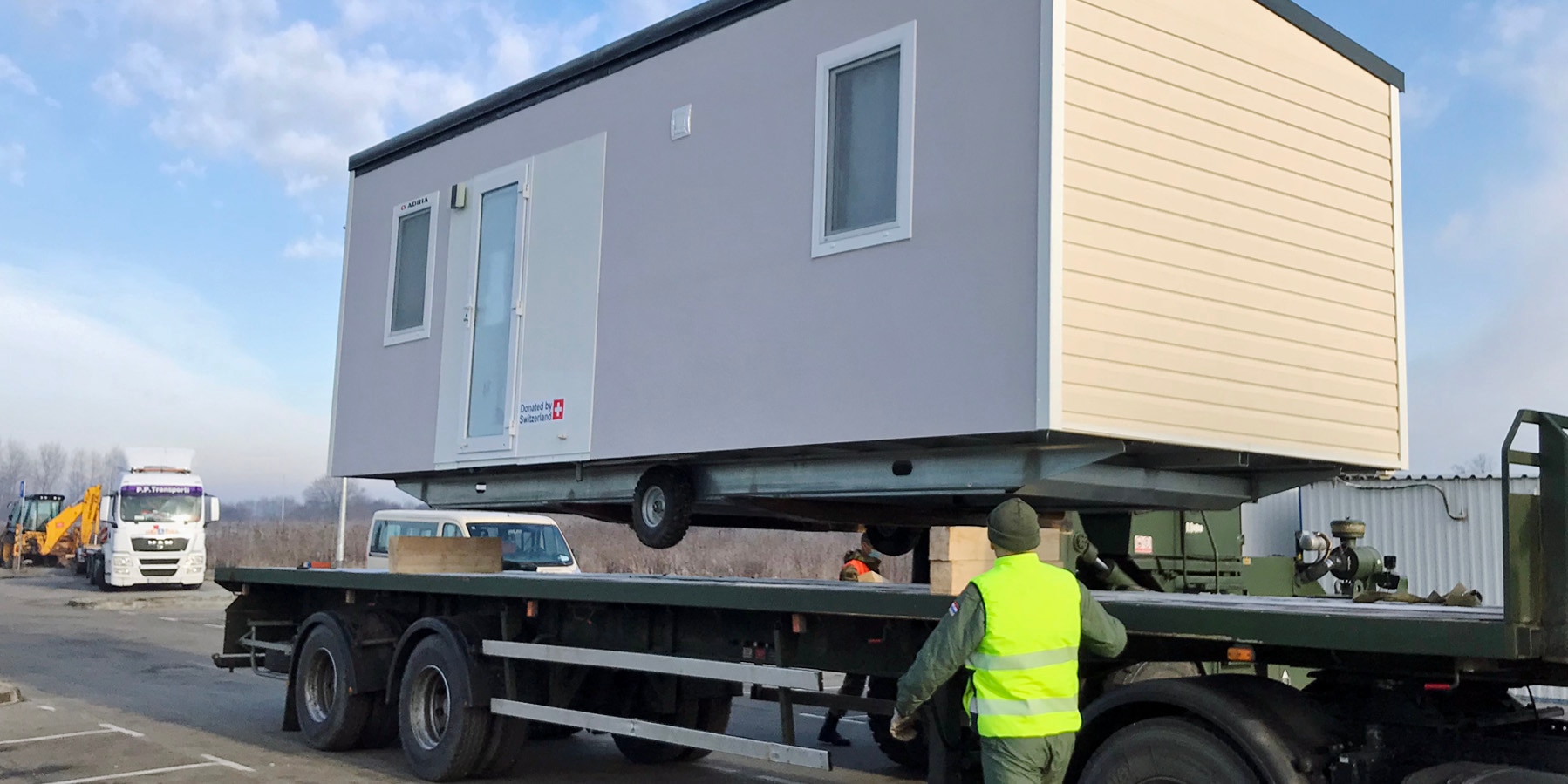
Twenty mobile housing units were handed over by Swiss Humanitarian Aid to the Croatian civil defense, which has already taken care of the rapid distribution to the families. © FDFA
An unusual kind of handover ceremony took place on 27 January in Petrinja: Swiss Humanitarian Aid delivered 20 mobile housing units to Croatia's civil protection authorities, who quickly allocated them to the families in need. The Swiss ambassador to Croatia and her colleagues were present at the ceremony, while the Croatian authorities were represented by State Secretary Irena Petrijevčanin Vuksanović (Ministry of the Interior) and State Secretary Zdenko Lucić (Ministry of Foreign and European Affairs). The meeting was symbolic of the effective and ongoing team effort in which various Swiss and Croatian actors collaborated to provide aid to the victims of the earthquake.
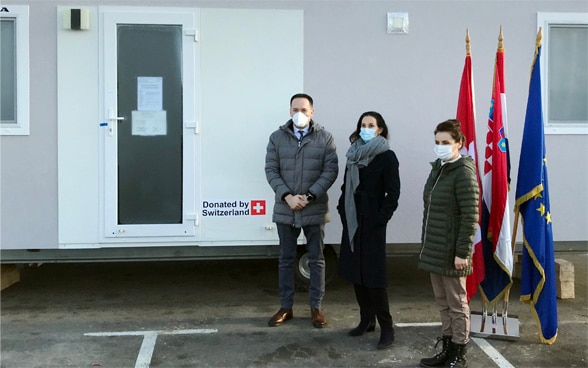
In its vital role as a bridge between these actors, the Embassy of Switzerland in Croatia was able to draw on its experience of previous cooperations, the good relationships it has cultivated over time, and the prevention work carried out to date. "In 2015, Swiss Humanitarian Aid collaborated closely with Croatian civil protection authorities during the migration crisis," Ambassador Georgieva explains. "Our embassy had good contacts with them thanks to an exercise carried out specifically to prepare for cooperation in a crisis situation. It was very helpful to be able to count on them in this situation too."
Swiss Humanitarian Aid sent two of its specialists – architects Rolf Grossenbacher and Michael Stoller – to Croatia, where they received support from the embassy in their communications with local actors. Speaking in a previous interview, they explained that finding emergency shelters quickly was a priority due to the harsh winter conditions. With the mobile housing units now ready and the first part of the Swiss relief operation complete, what role will the embassy in Zagreb play going forward? "The embassy will continue to maintain and nurture its network of contacts with the local authorities and respond to the many requests for support that it still receives," explains the ambassador. In addition to the housing units delivered to the region where the earthquake struck, 12 sanitary facilities containing showers, toilets and kitchens are currently under construction as part of a second donation. "Here too we'll be supporting our colleagues from Swiss Humanitarian Aid to help finalise the contracts and resolve logistical and financial issues relating to Croatian law. In order to provide people who have lost their homes with a solution that meets their needs, good cooperation with the local authorities and a well-oiled logistical process behind the scenes are essential," Georgieva says.
However, Switzerland and Croatia's excellent relations aren't limited to humanitarian work. In fact, they also stem from the reconstruction work carried out in Croatia during and after the war. "The recent earthquake struck the region of Petrinja, which had already been hit hard by the war and is still behind other parts of the country in terms of development. Even today, there are a lot of mines and other explosive remnants of war in the region," Georgieva explains. As part of its contribution to the enlarged EU, Switzerland has financed a demining project that has also benefited the region of Petrinja. The project aims to improve the quality of life of people living in areas contaminated by mines. Ambassador Georgieva provided a few figures: "In September 2018, Croatian mine clearers demined 1.8km² of the Kotar-Stari Gaj forest near Petrinja. They disarmed some 3,585 explosive devices left over from the Croatian war."
Switzerland's contribution to the enlarged EU also supports the creation and expansion of systems for drinking water distribution and wastewater disposal, particularly in rural areas, which often only have access to a cesspit. Switzerland and Croatia's collaboration also extends to research and the modernisation of vocational training. "And let's not forget," Ambassador Georgiev notes, "that the excellent bilateral relations are above all the product of numerous exchanges between Swiss and Croatian citizens. Switzerland has benefited from a major Croatian diaspora, while Croatia welcomes many Swiss tourists during the summer. These exchanges not only result in close interpersonal relationships, but also in 'people-to-people' projects that in turn contribute to mutual understanding."
Swiss Humanitarian Aid
Swiss Humanitarian Aid acts before, during and after conflicts, crises and natural disasters to serve the interests of people in need. It focuses on the reconstruction and rehabilitation of affected areas, disaster risk reduction, the protection of vulnerable people and emergency relief efforts. Swiss Humanitarian Aid is part of the Swiss Agency for Development and Cooperation (SDC) within the Federal Department of Foreign Affairs (FDFA).

